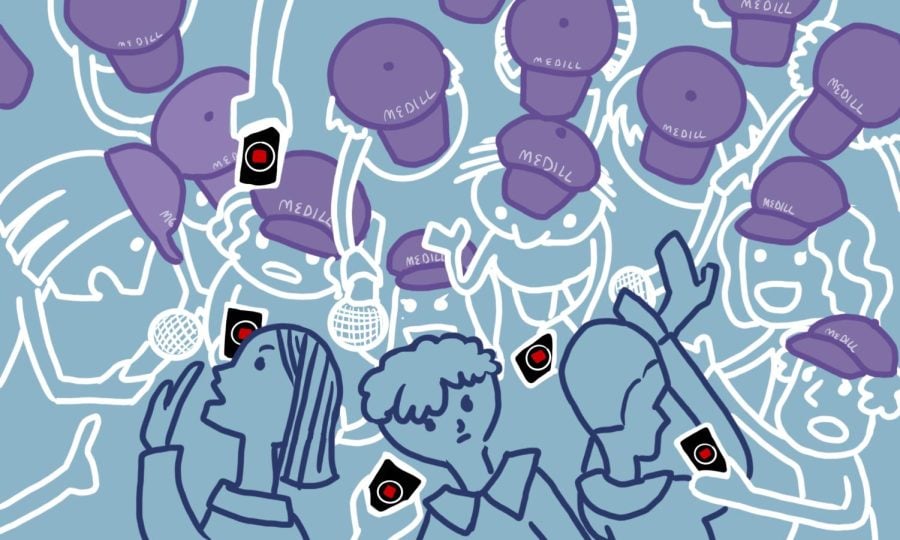‘War is not just numbers’: Students discuss controversies with covering war in Ukraine for Medill assignments
A Journalism 201-1 assignment became a subject of controversy last spring after students were assigned to cover sensitive topics, such as the war in Ukraine.
February 15, 2023
All undergraduate students at the Medill School of Journalism, Media, Integrated Marketing Communications are required to take Journalism 201-1: Fundamentals of Reporting and Writing News. For some, it is their first exposure to journalism practices.
But, in recent years, students have criticized some of the course’s assignments.
Some Medill students said the class required them to cover sensitive topics, while non-Medill students described uncomfortable experiences being asked questions about their identities and communities insensitively during interviews.
One of the reported stories, called the “reaction assignment,” was a subject of controversy last spring. Students said that for the assignment, professors required them to speak with individuals and write about their reactions to a newsworthy event.
Medill sophomore Maggie Rose Baron, who took Journalism 201-1 last Spring Quarter — her first Medill course at NU — said her lab professor allowed students to choose between two topics for the reaction assignment: the war in Ukraine or Tiger Woods’ return to golf following a car crash.
Like most students in her lab, Baron said she wrote about the war in Ukraine. She appreciated having the ability to choose which topic to cover, though she said she would have preferred a better second option.
Baron said she believes students shouldn’t have to write about sensitive issues if they don’t feel prepared.
“I don’t think that it should be something you have to do in an intro class,” she said. “Some people just aren’t at the level where they can do it justice and cover it properly.”
Weinberg sophomore Andrew Kupfer had the same professor as Baron. Kupfer also wrote about the war in Ukraine for the reaction assignment and interviewed acquaintances and strangers.
But he said he didn’t think it was appropriate to approach Ukrainian students for the assignment given the timing.
“It never occurred to me to reach out to (Northwestern for Ukraine) for this project — it’s not something that’s going into a newspaper,” Kupfer said. “The whole point is to learn about how to talk with people, how to just get some stories.”
The reaction assignment was a chance to cover a meaningful topic, he said, but covering the war in Ukraine could also be exploitive of peoples’ experiences.
Kupfer said his lab professor encouraged students to step out of their comfort zones and be bold.
“For this assignment, it was important not to just hover above the subject,” Kupfer said. “That’s difficult but that’s what (the lab professor) wanted us to practice, so I appreciated that.”
At the same time, student journalists have to be empathetic and reasonable, Kupfer said.
Though Weinberg freshman Andre Shportko, a member of Northwestern for Ukraine, was not interviewed for the assignment, he said he knew at least one student who was.
“For (the Ukrainian student), the war was an actual life event,” Shportko said. “For the students who were completing their assignment, it was just schoolwork.”
Shportko said he begins most days by checking for updates on the war in Ukraine.
He said the January helicopter crash that killed several Ukrainian government officials, including the interior minister, occurred miles away from his village.
“War is not just numbers or statistics or weapons or ammunition. It’s also about the life stories of people,” Shportko said. “I think it will be much more important to understand what it takes to live in the war.”
Kupfer said empathy in journalism requires establishing trust with sources. One way of building trust, he said, is to express care for the source’s story.
Shportko encourages everyone — especially journalists — to learn more about Ukraine and be better listeners.
“That way, it is easier to share and to connect to the interviewer,” Shportko said.
At least seven Medill professors and faculty declined to comment or said they did not feel comfortable speaking on the controversy.
Email: [email protected]
Twitter: @caseeey_he
Email: [email protected]
Twitter: @JessicaMa2025
Related Stories:
— Professors break down racial and LGBTQ+ health disparities in forum
— Medill celebrates its centennial with panel addressing major topics in journalism
— Robert Brown named Medill’s inaugural director of diversity, equity, inclusion and outreach


